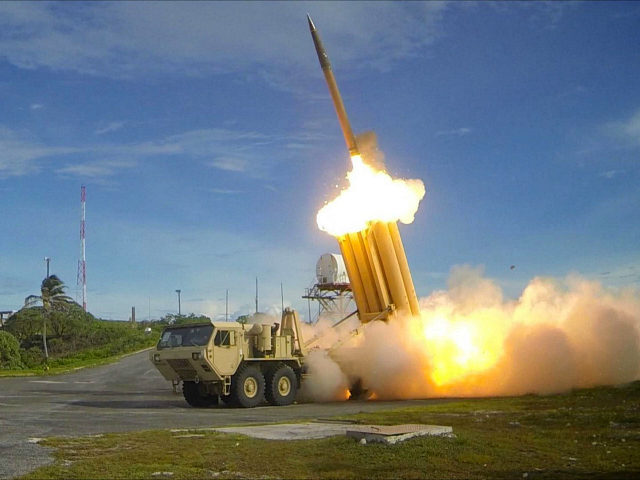Numerous articles in Chinese state-controlled media are encouraging Chinese nationals to boycott the Lotte Group, a South Korean conglomerate that recently approved a land deal making the deployment of a new U.S. missile defense system in the country possible.
Both Seoul and Washington have insisted that the Terminal High Altitude Area Defense (THAAD) defense system targets only North Korea, whose government has engaged in increasingly erratic behavior in the past several months, including the possible use of a weapon of mass destruction. As the THAAD technology allows missiles to reach well into China and Russia, however, both nations have objected to its presence on the continent.
On Monday, the Lotte Group agreed to allow the South Korean Defense Ministry to use land currently housing a golf course to install the THAAD system. Earlier this year, American and South Korean officials reportedly agreed to ensure the installation of the THAAD system in South Korean territory by July 2017, according to a Japanese news report.
The state-run Global Times propaganda outlet insisted that Chinese nationals boycott the Lotte Group on Tuesday. “From any perspective, adopting counterattacks toward Seoul is a must for Beijing,” an editorial in the newspaper read. “Showing Lotte the door will be an effective warning to all the other foreign forces that jeopardize China’s national interests. This is the dignity China should have as a major power.”
The article not only called for Lotte Group’s presence in China to “come to an end,” but all South Korean exports. “We also propose that Chinese society should coordinate voluntarily in expanding restrictions on South Korean cultural goods and entertainment exports to China, and block them when necessary,” the article added. “Let’s see how far South Korean TV dramas and stars can go without strong support from the Chinese market.”
Reuters adds that the Chinese-language Global Times added South Korean cars and cell phones to the list of items Chinese people should boycott in response to the Lotte agreement.
In a separate article, the Global Times accuses the Lotte Group of being embroiled in the sprawling corruption scandal that triggered the impeachment of South Korean President Park Geun-hye. “The retail giant is suspected of donating millions of dollars to nonprofit foundations controlled by Choi Soon-sil, Park’s longtime confidante who is at the center of the scandal,” the Times claims. That same article warns, “Exasperated Chinese people may boycott Lotte products and services.”
Xinhua, the Chinese state news agency, took a similar attitude toward Lotte, though its tone, as usual, was significantly less abrasive than the Times. “Lotte may have its case in allowing the land swap for the THAAD installment, however, it is not Chinese consumers’ job to verify it,” Xinhua’s report on the sale read. “Chinese consumers can absolutely say no to this kind of company and their goods based on considerations of ‘national security.'” Xinhua also accused South Korea of having “sacrificed the delicate strategic balance in the region for an illuded target of achieving peace through muscle-flexing.”
The Chinese Foreign Ministry did not make similar calls, instead telling reporters in its regular briefing Tuesday that Chinese people “will determine whether a foreign company is successful in China,” without noting the Chinese government’s overt discouraging of citizens doing business with Lotte. Ministry spokesman Geng Shuang said of Lotte that China “welcomes foreign companies to make investments and do business in China, and always respects and protects the lawful rights and interests of foreign companies in China.”
Geng added: “We strongly urge relevant parties to take China’s interests and concerns seriously, stop the deployment process and not to go further down that wrong path. China has twice lodged solemn representations with the ROK [Republic of Korea] for the latest developments.”
South Korea’s Foreign Ministry has responded to concerns by insisting that North Korea’s increasingly unpredictable behavior necessitates greater defense. “We will maintain our principle that the decision for the THAAD installation is a sovereign and self-defense act aimed at protecting the country and its people from North Korea’s nuclear and missile threats,” spokesman Cho June-hyuck said on Tuesday. “While keeping a close eye on action being taken by China, we are thoroughly exploring relevant countermeasures,” he added, suggesting Seoul will act to protect the Lotte Group.
Pyongyang has become increasingly belligerent to its neighbors, even its largest trade partner China, following the death of Kim Jong-nam, the brother of dictator Kim Jong-un, in Malaysia. Malaysian authorities found that Kim was killed with the highly deadly VX nerve agent, classified as a weapon of mass destruction. Following Kim’s death, China suspended coal shipments from North Korea for the rest of the year, citing UN sanctions and claiming Kim’s killing had nothing to do with their decision.
North Korea promptly responded with a scathing post in its state-controlled media calling China a “U.S. vassal state” and claiming that Beijing was “dancing to the tune of the U.S.” to “bring down the social system” of North Korea.
China has welcomed North Korean vice foreign minister Ri Kil Song for talks this week with Chinese Foreign Minister Wang Yi.

COMMENTS
Please let us know if you're having issues with commenting.